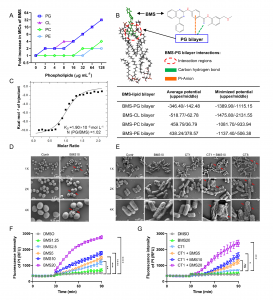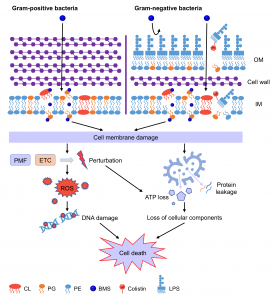A research team led by Lee Tsz On, associate professor in the Faculty of Health Sciences (FHS) at the University of Macau (UM), has made a breakthrough in the study of bacteria. They have identified a novel antibacterial compound that can effectively kill bacterial pathogens that are resistant to antibiotic treatments, providing a new strategy for treating drug-resistant bacterial infections. The research results have been published in the internationally renowned journal International Journal of Antimicrobial Agents.
Bacterial infections were once one of the greatest threats to human health. The deadliest pandemic in human history, known as the Black Death, devastated medieval Europe, resulting in approximately 200 million deaths worldwide. It was later confirmed that the culprit behind the Black Death was the bacterium Yersinia pestis. In the past, due to the lack of effective treatment methods, even a minor bacterial infection in a wound could be life-threatening. With the advent of antibiotics, this dark period saw a ray of hope. Antibiotics enabled us to treat wound infections and respiratory tract infections effectively, as well as perform various surgeries safely. However, with the widespread use of antibiotics, bacteria have gradually evolved the ability to evade antibiotic killing, leading to antibiotic resistance. As more and more bacteria are proving resistant to multiple or even all clinically available antibiotics, it seems that another dark period similar to the pre-antibiotic era is upon us. Therefore, the development of new antibacterial drugs has become imminent to address the growing problem of antibiotic resistance.
To quickly identify new drugs that can effectively combat drug-resistant bacteria, the research team screened a commercial chemical compound library. Most of the compounds in the library are already approved for treating non-bacterial infections. Reutilising these approved drugs to treat drug-resistant bacterial infections would not only significantly reduce the time required for new drug development, but also avoid potential unknown side effects and fully explore the clinical value of these drugs. After a series of screenings, the research team discovered a compound called BMS. This compound can not only kill drug-resistant bacteria directly, but also enhance the therapeutic effects of the clinical antibiotic colistin. The results showed that the compound exhibits good therapeutic effects against many drug-resistant clinical bacteria and even multidrug-resistant bacteria. In addition, the research team also analysed the BMS compound’s target on bacteria and its mechanism of action. The study found that the compound primarily targets the phospholipids on the bacterial cell membrane and exerts its antibacterial effect by damaging the bacterial cell membrane and causing metabolic disturbances in the bacteria. The research provides new insights into the treatment of drug-resistant bacterial infections and the development of novel antibacterial drugs to combat the antibiotic resistance crisis.
Prof Lee and Zheng Jun, former associate professor in the FHS, are the corresponding authors of the study. PhD student Zhang Nian is the first author. Associate Professor Tam Kin Yip, and PhD students Shan Wenying, Gao Liangliang, and Kou Si Hoi in the FHS, technicians Lu Chang and Yang Huilin from Peking University Shenzhen Hospital, and Prof Peng Bo from Sun Yat-sen University also made important contributions to the study. The research was supported by the Science and Technology Development Fund of the Macao SAR (File no: 0016/2020/A1), and UM (File no: MYRG2020-00226-FHS and MYRG2022-00240-FHS). The full version of the paper can be viewed at https://pubmed.ncbi.nlm.nih.gov/37328075/.
| Source: Faculty of Health Sciences | |
| Media Contact Information: | |
| Communications Office, University of Macau | |
| Albee Lei | Tel: (853) 8822 8004 |
| Bell Leong | Tel: (853) 8822 8009 |
| Email: | prs.media@um.edu.mo |


